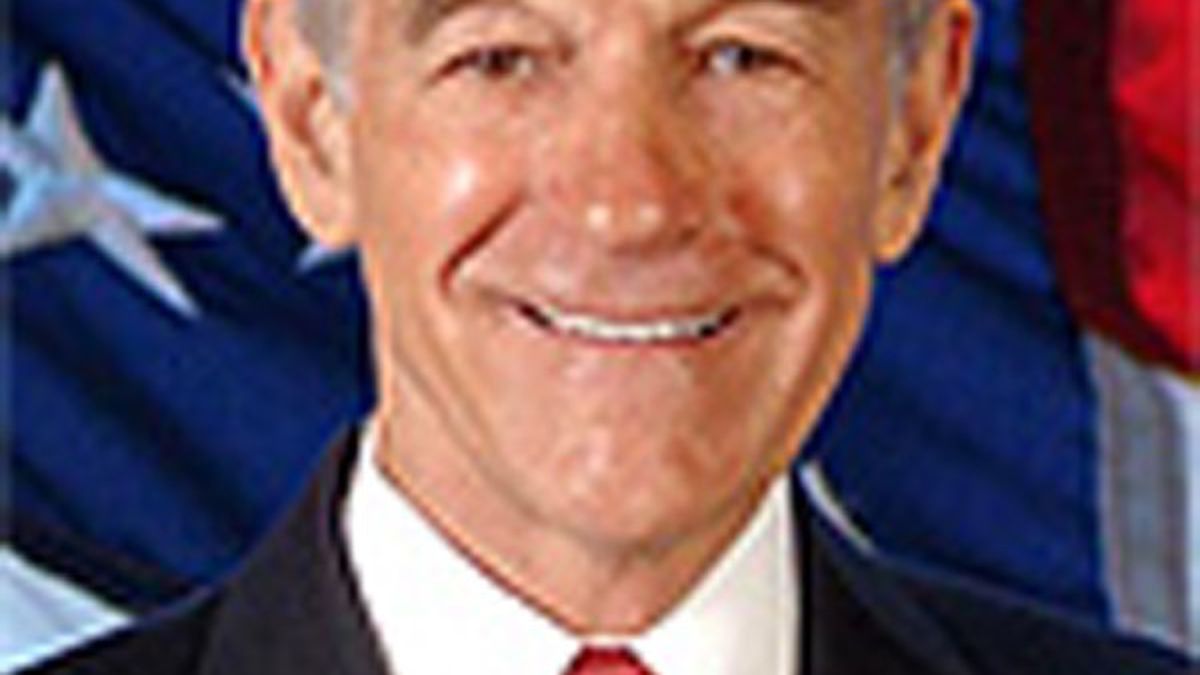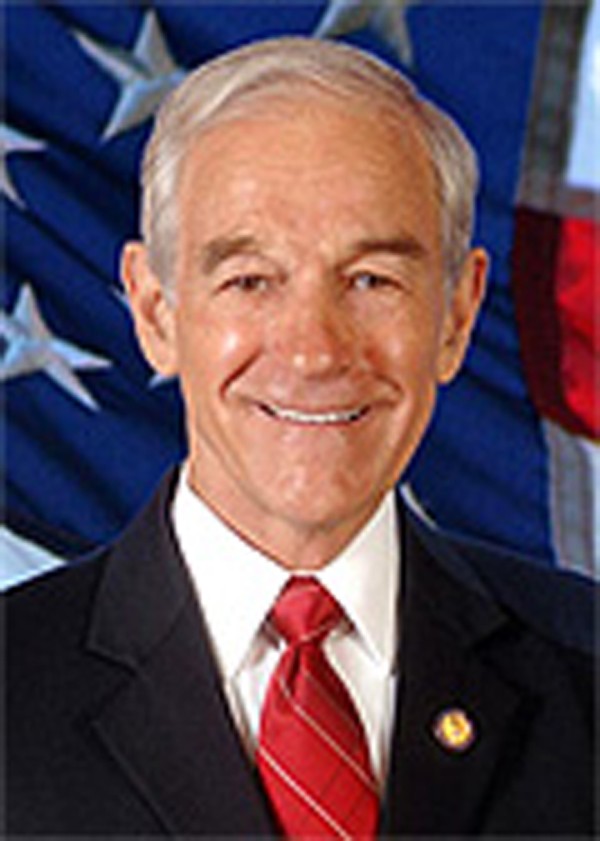The Ron Paul army has invaded the progressive strongholds of Berkeley, Oakland, and San Francisco, a conspicuous presence at local anti-war marches, college campuses, and major traffic intersections. Mainly voters in their twenties and thirties, and far beyond mere supporters, members of the group are bona fide devotees of the cause, gripped by Paul’s libertarian straight talk and steadfast platforms. Their “Ron Paul Revolution” banners and T-shirts, which compete in visibility with the paraphernalia of the major Democratic contenders, conjure the image of a left-wing messiah, not a 72-year-old pro-life libertarian congressman from South Texas.
Paul’s candidacy is still very much a long-shot. But for a relatively unknown politician who was largely overlooked in 1988, when he ran as the Libertarian Party candidate, the nationwide appeal of Paul’s current bid is something of a phenomenon. And the fascination with him among young voters across party lines continues to grow, as does his impressive campaign coffers. Thanks to an innovative online grassroots organizing strategy, a network of Ron Paul meet-up groups have spread like wildfire throughout the Bay, reminiscent of the ephemeral Howard Dean craze in 2004.
Paul’s network has garnered an impressive level of support and campaign donations. That includes $19 million raised in the fourth quarter of 2007 alone, the second best quarter of any Republican in the entire election cycle. Much of the help has come from California, with donors here sending more money than even Paul’s native Texas. On December 16, the campaign held an online fund-raiser, called a “money bomb,” to commemorate the anniversary of the Boston Tea Party. It raised more than $6 million in one day, a new record, according to Contra Costa meet-up organizer Jun Dam, who says that unlike the large individual donations received by many other candidates, most of Paul’s are $100 or less, sent en masse.
“A lot of people I’ve talked to have kind of given up on the whole process until Ron Paul came along,” Dam said. “[They] never did anything campaign-related. Paul’s message really energized them.”
If you ignore party affiliation and cover up half of Ron Paul’s list of campaign platforms, his local support base seems to make some sense. An ardent proponent of limited government and minimal fiscal spending, Paul is the only candidate in his field who opposed the invasion of Iraq and now advocates for an immediate pullout of US troops as well as a major downsizing of our military presence throughout the world. He urges a strict interpretation of the Constitution, which he says was meant to keep government small and does not authorize foreign invasions. If elected, he promises to throw out current drug laws and criminal sentences against non-violent drug offenders, fervently protect civil liberties, and completely repeal the Patriot Act and other pieces of legislation that result in more centralized government and fewer individual rights.
“Not a lot of people are focusing on our constitutional rights and the loss of those rights,” said Sarah Trafican, 24, a graduate student who co-heads the Berkeley meet-up group, which convenes weekly and has more than one hundred members. In 2004, she favored John Kerry but has long been distrustful of the electoral system, and until this year, has never registered to vote. “I didn’t feel that my vote would count. Now I feel like I’m having an impact. It really feels like there’s a Ron Paul army that’s creating change.”
Trafican said that most people in the Berkeley group are either political independents or former Democrats and Greens, but few Republicans. She oversees large canvassing efforts in the East Bay and, up until the deadline in late January, was trying to convince Paul supporters to register as Republicans in order to vote for him in the state’s February primary (she got her Democrat-registered parents to switch sides, too). While she disagrees with Paul on certain social positions, including his pro-life stance, she explains that it doesn’t really matter since he believes that the federal government shouldn’t have the authority to decide on those issues anyway.
“Having a liberal base switch over doesn’t surprise me because even though it sounds like the opposite [politically], we really do believe in the same thing — the Constitution,” she said, noting that a number of socialists have signed on as well.
Berkeley co-organizer Ralph Crowder, 31, said he’s surprised that many in his group have chosen Paul over Democrat Dennis Kucinich, who shares many of the same beliefs regarding the war and civil liberties, but also has a liberal social agenda more in line with many Bay Area voters. He attributes this to the power vacuum in the Republican field and a belief that Paul, unlike Kucinich, actually has a small shot at the nomination.
“It’s amazing how freedom unites people,” Crowder says. “We can all go back to disagreeing about social issues once the Constitution is taken care of.”
But the issues on the other half of Paul’s position list seem like they might be a bit difficult for some left-leaning voters to ignore. Central to Paul’s main platform is a call to abolish the IRS, get rid of Social Security taxes, and eliminate the federal income tax, a measure that would cut the budget roughly in half. And while some voters frustrated by the hefty deductions on their paychecks may take kindly to this plan, it also would mean slashing many government services geared toward the poor. With that would come a massive reduction in funding for social services, including health care, welfare, and, perhaps most prominently, public education. According to a 1988 New York Times article covering his first presidential campaign, Paul said that he would abolish public schools altogether, along with welfare, Social Security, and farm subsidies. While he’s recently denied these remarks, he openly calls for the dissolution of the Department of Education.
His position on immigration calls for no path to legalization, a fenced border, an end to birthright citizenship, and a complete cut in services to illegal immigrants, including hospitals and schools.
And then there are the newsletters. An article in the New Republic in early January describes at length a series of Ron Paul bulletins, whose titles changed over the years — from Ron Paul’s Freedom Report to The Ron Paul Political Report — that have been published nearly monthly since 1978. The material is fraught with government conspiracy theories, arguments supporting right-wing militias, and unabashed bigotry towards blacks, gays, and Jews. One entry specifically chastises gay men in San Francisco: “These men don’t really see a reason to live past their fifties,” it says, adding, “They enjoy the attention and pity that comes with being sick.”
One issue, published in 1992 after the Los Angeles riots says “order was only restored in L.A. when it came time for the blacks to pick up their welfare checks.” Martin Luther King Jr. is also consistently castigated in the publication, called among other things, a “pro-communist philanderer.” One entry refers to the federal holiday bearing his name as “our annual Hate Whitey Day.” And while bashing King, the newsletter praised former Ku Klux Klan leader David Duke during his run for Senate in 1990.
The newsletters may help explain why several white supremacist groups now support the same candidate as a bunch ex-leftists from Berkeley. In December, Paul’s campaign received $500 from Floridian Don Black, who runs a web site called Stormfront, which has the motto “White Pride World Wide.” Despite public pressure, Paul has refused to return the donation. Nevertheless, Paul supporters were out in force at this year’s Martin Luther King Day march in San Francisco, hoisting the banner of their man. They raised nearly $2 million that day in another online “money bomb,” according to organizer Dam.
Paul claims that King is one of his personal heroes and denies any involvement in writing — or being at all aware, for that matter — of the content of the controversial newsletters, despite the fact that they bear his name. Regarding the newsletter, Dam says that they are “not the kinds of things that he would say. They’re not something that he himself wrote.” He adds that they were strategically exposed, an act of mudslinging in order to malign Paul right before Super Tuesday.
Leah DiTullio, an East Bay Dennis Kucinich team leader, says she’s not too fazed by Paul’s presence in the area or the prospect of him taking away votes from her candidate. She says that Paul’s supporters are responding to some really good things, including his anti-war stance, and that if they weren’t voting for him, they might not be voting at all. DiTullio notes, though, that it seems strange that some politically progressive Paul loyalists don’t consider just supporting Kucinich.
“It’s a little funny,” she says. “I’m assuming the Berkeley Ron Paul phenomenon just shows that people don’t look terribly hard at the candidates. … A lot of people don’t really know where the candidates stand on the issues.”














